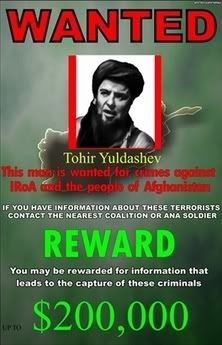
BAGRAM, Afghanistan - The U.S. military has launched a new "Most Wanted" campaign offering rewards of up to $200,000 for information leading to the capture of 12 Taliban and al-Qaida leaders.
Posters and billboards are being put up around eastern Afghanistan with the names and pictures of the 12, with reward amounts ranging from $20,000 to $200,000.
"We're trying to get more visibility on these guys like the FBI did with the mob," said Lt. Col. Rob Pollock, a U.S. officer at the main American base in Bagram. "They operate the same way the mob did, they stay in hiding."
The list does not include internationally known names who already have large price tags on their heads like al-Qaida chief Osama bin Laden — who has evaded U.S. capture since 2001 despite a $25 million bounty — or Taliban leader Mullah Omar with a $10 million reward.
Instead the list is filled with local insurgent cell leaders responsible for roadside and suicide bomb attacks.
"We want the people in that area to know who this guy is and know he's a bad guy, and when they spot him to turn that guy in," said Maj. Chris Belcher, a U.S. spokesman.
The program, in the works for weeks, comes despite peace overtures from President Hamid Karzai, who on Sunday said he would be willing to meet with Omar if it would help bring peace.
The posters and billboards will be put up by Afghan soldiers and police in areas where the military suspects the men are operating, said Belcher. Some on the list are also suspected to operate in Pakistan's tribal regions, where the U.S. military does not have the authority to operate.
The U.S. says it has killed around 50 mostly mid-level insurgent leaders over the past year, a strategy the military is continuing to push with the Most Wanted rewards program.
The highest-ranking leader killed this year was Mullah Dadullah Lang, a one-legged militant who orchestrated a rash of Taliban suicide attacks and beheadings. He died of gunshot wounds in a U.S.-led coalition operation in Helmand in May.
"You disrupt the network when you take out the leadership. It has an effect," said Belcher. "Those mid and high-level leaders are coordinating the action across Afghanistan. By taking them out there's at least a temporary disruption in the ability of the subordinates to continue coordinated operations."
Among the 12 men on the Most Wanted list, the U.S. is offering the $200,000 reward for five of them, including:
• Abu Laith al-Libi: An al-Qaida training camp leader who has appeared in many Internet videos and who the U.S. says was likely behind the February bombing at the U.S. base at Bagram during a visit by Vice President Dick Cheney.
• Saraj Haqqani: Son of longtime warlord Jalalludin Haqqani and believed to have connections with al-Qaida.
• Tahir Yuldash: The leader of the Islamic Movement of Uzbekistan and an al-Qaida operational commander.
Pollock said the U.S. is offering up to $10,000 to Afghans who turn in any foreign fighter, such as militants from Arab countries or Chechnya, Turkey, or Uzbekistan. The U.S. has also been paying money to Afghans who tell authorities about roadside bombs that have been planted.
"This is not necessarily a new program, we're just putting a lot more energy into it now," Pollock said.

0 comments:
Post a Comment